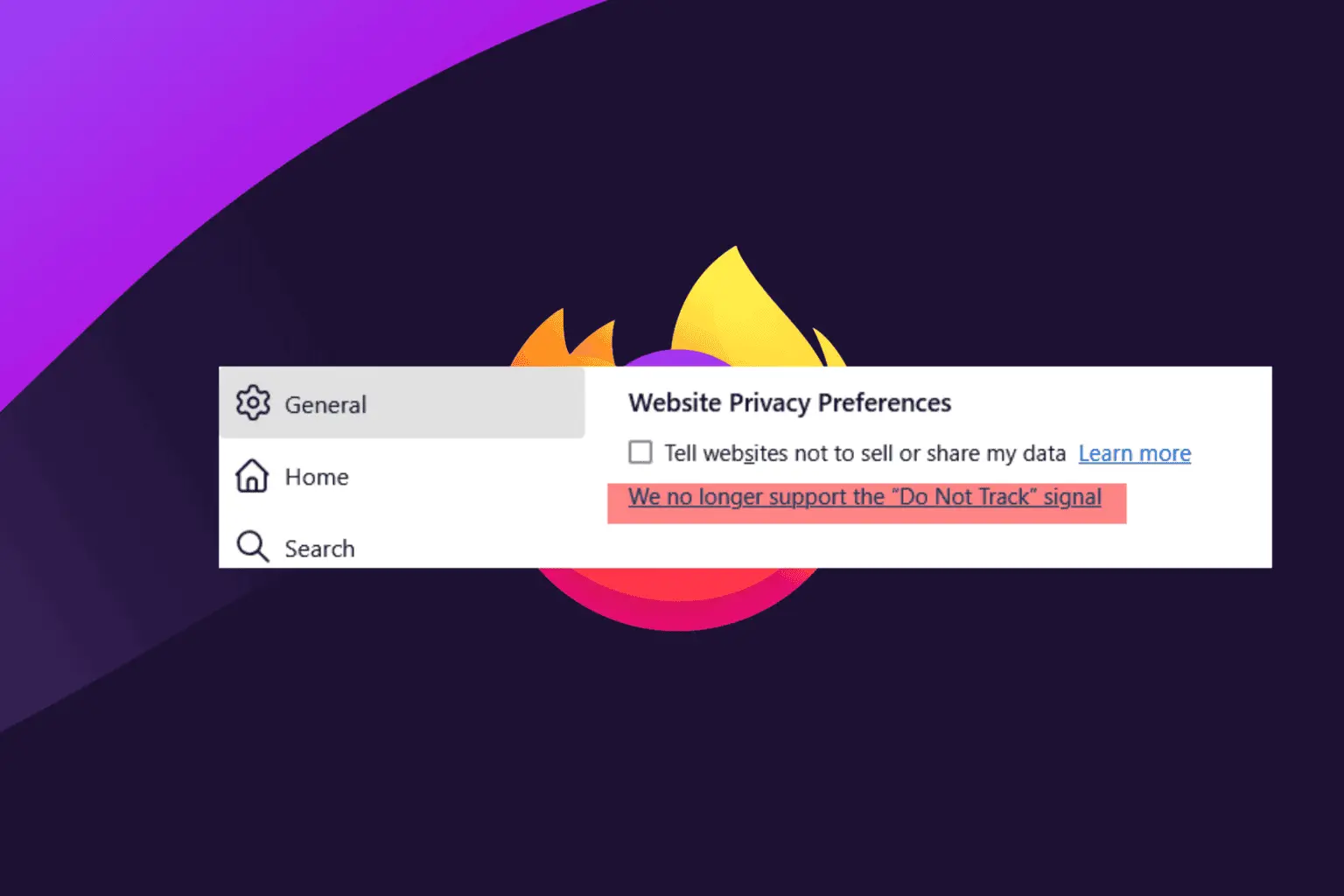Good, it’s about time the lie of Do Not Track was put to bed. It gives people a false sense of control over their data and privacy - the intention was good but if it’s not enforced then it makes people think they’ve done something to protect their privacy when they have done nothing.
plus it was another data point for profiling people based on their browser settings.
It was also possible to be used as part of a fingerprint.
Its removal is as useful in preventing fingerprinting as its presence was in protecting privacy.
This is sad and yet another step backwards for Firefox. Yes, not many websites honored it, but some did and automatically set cookie preferences accordingly. There should’ve been more lobbying for this to become legally binding within the EU instead.
It was a double-edged sword. While websites could honor it, it could also be abused as another data point for fingerprinting.
Even more reason to make it legally binding.
How are you going to prove that this particular metric was used to fingerprint? That’s the issue I have - you can identify cookies, pixel trackers etc but there’s no way to prove whether a site uses a flag you send anyways. And enforcing something that can’t be proven is really hard - currently, not only the easy rules are enforced.
If it was law to abide to the Do Not Track setting, then a leak about a company dishonoring this would simply face massive fines, which is usually enough encouragement for them to abide.
So they just set up hosting for the site or service in a locale that doesn’t have those laws.
Now what?
That does not matter. If you operate within the EU then you have to abide to EU law.
Legalism mentality is cringe, we need solutions that work against criminals who don’t care. When people push for legalist solutions it shows they have no real understanding of how the world actually works and just want to complain about what people should and shouldn’t do.
Shoulds are irrelevant in this world, people do what they want, even if it is illegal, in the digital world where there are way less clues left behind of illegal activity we need solutions that actually do something, like actually blocking those trackers, or feeding false fingerprint data that changes everytime or is exactly the same as other browsers. Not expecting the providers to follow the law, they believe they are above the law until they get caught, then they’ll act apologetic and start doing it again.
Your assumption is based on the idea that these people are not criminals, which is wrong.
Feel free to go to some shithole in the middle East or Africa where there is no rule of law and see how that works out for you.
Your assumption is based on the idea that these people are not criminals, which is wrong.
They are not criminals until they actually break laws. Yes. That’s how rule of law works. That’s why there need to be laws that regulate them. Welcome to the real world.
Feel free to go to some shithole in the middle East or Africa where there is no rule of law and see how that works out for you.
Even you know that comparing digital cyber-crime and white-collar criminals to that is a horrible comparison, like comparing apples to oranges, but you weren’t hoping to have a reasonable discussion, you were hoping I wouldn’t notice this flaw in your logic and that it would simply shut me up. I know you and your type very well.
They are not criminals until they actually break laws. Yes. That’s how rule of law works. That’s why there need to be laws that regulate them. Welcome to the real world.
You think they’re not breaking laws already? You think these big tech white-collar businessmen aren’t already white collar criminals engaged in multiple types of crimes? You must be either very naive or just in-denial about it because they almost certainly are, and most act compliant and apologetic only after they get caught. Therefore a system that relies on them complying and not tracking you before they’ve been caught violating it, will not work. It’s exactly what they want because the other option, the better one interrupts their tracking regardless of whether they want to comply or not.
Even you know that comparing digital cyber-crime and white-collar criminals to that is a horrible comparison, like comparing apples to oranges, but you weren’t hoping to have a reasonable discussion, you were hoping I wouldn’t notice this flaw in your logic and that it would simply shut me up.
No, I was hoping you’d understand the differences between a place that follows the rules of law, and one that doesn’t. But given your previous comments that was already nothing but false hope, of course.
I know you and your type very well.
Oh yeah? What type would that be? Someone who’s standing up to fascists and terrorist simps?
You think they’re not breaking laws already? You think these big tech white-collar businessmen aren’t already white collar criminals engaged in multiple types of crimes?
You’re derailing, it’s not about whether they commit ANY crimes. The topic was very specifically about whether they break the law by tracking users and collecting their data, or whether it would be already illegal to ignore the Do-Not-Track feature. And no, neither of those things is illegal. That’s the point. The internet may fall under old laws too, but it created a bunch of new cases that do not fall under any laws. That’s also why we’ve seen the GDPR within the EU as some of the first means to challenge a lot of those “new” cases that are happening on the internet. Or the AI Act to regulate those fields since more and more places started to use this tech in ways that were highly problematic - but not illegal before that. If we create new possibilities, then we also need to regulate those possibilities through new laws as well. This is really not a hard concept to understand.
Oh yeah? What type would that be? Someone who’s standing up to fascists and terrorist simps?
Average political troll like @Linkerbaan@lemmy.world (banned now). I mean you were literally banned for calling leftists radicalized terrorists, just like linkerbaan was banned for similar bad faith name-calling and accusations. Modlogs, they’re a very nice thing on Lemmy, even if you don’t have them on mbin.
Oh and before you start crying about being abused by mods and admins, I haven’t been banned from instances or communities for hate speech or aggression, mods don’t regularly tell me to stop doing that because it’s against the rules. I don’t have a modlog filled with aggressive comments calling people names or making repeated bad faith accusations that don’t hold any merit. If you don’t realize how the problem is with you and your behavior you’ll probably continue to be banned and have comments removed, adding to your reputation.
You’re derailing, it’s not about whether they commit ANY crimes.
It’s about whether they would, and they would and do which is why I called them criminals, and if we’re discussing the topic of DNT why’d you stop there? You realize that what I said about it is completely true.
Therefore a system that relies on them complying and not tracking you before they’ve been caught violating it, will not work. It’s exactly what they want because the other option, the better one interrupts their tracking regardless of whether they want to comply or not.
That a system which does not enforce their own compliance won’t work, and that they’ll love it because they can not comply and if they don’t get caught nothing will happen. It’s a system that does not work with the average big tech white-collar criminals who think they are above the law and only start giving a fuck after they get caught.
Whereas actually blocking their trackers (and advertisements in extreme mode) and feeding them false fingerprinting data does solve the tracking problem, better than asking them and assuming their compliance ever could.
It did basically nothing and just made you easier to identify and gave false sense of privacy. Good riddance imo
It was like wearing a technicolor badge with flashers that said “don’t look at me” while playing the sound from Inception.
It made you more trackable because the entire ad industry ignored it. While there were a true, TRUE handful of sites that respected it, those are never the sites usually it was meant to deal with.
Presumably it’s easier to lobby for something that’s already legally enforced elsewhere. And sometimes lobbying is just unsuccessful.
With a reasonable alternative available, removing the additional fingerprinting vector seems like the best idea to avoid tracking. The few good actors can look at the Global Privacy Control instead, so there’s literally no downside here.
How’s that different?
GPC? It’s different because there’s already a jurisdiction that legally enforces it.
Yeah, and I’ve been seeing more lately…
At least the forks will probably keep it…
How about the rare sites that respected it 🤔
If you respect it odds are that you aren’t part of the problem to begin with.
If you wish to ask websites to respect your privacy, you can use the “Tell websites not to sell or share my data” setting. This option is built on top of the Global Privacy Control (GPC). GPC is respected by increasing numbers of sites and enforced with legislation in some regions. To learn more about this, please read Global Privacy Control.
So those sites can look at that.
Ohh it’s forced by law in some countries, sounds better ngl.
why would small sites track you to begin with?
Talking about odysee,broadcomm,at&t,etc
so not small at all. i see you corrected the post too.
the main response to that is: how do you know they respect it?
Odysee it says in their privacy policy when they detect do not track is on they wont track you,At&t and boradcomm they have a system that sees the signal and declines tracking automatically
that doesn’t mean anything, since it’s all server side there’s no way to verify. that’s the problem with the dnt header. all it is is an extra data point.
also, fwiw i would not trust a service like odysee to abide by it’s own policy at all, considering its history.
ohh okay.
I bet all 6 of them will be really upset.
DNT is going to give a false sense of security.
- like leaving your shop door open when you go out for lunch and posting a sign saying ‘Don’t come in here and steal’.
It only works for websites who respect it, but leads users to think they’re somehow ‘protected’.
Privacy focussed engineers add DNT feature to browsers…
Marketeer assholes: hey, another tracking data point!
In fact, sadly, DNT can be used to track user because only few users enable it.
Which is exactly why I’ll never use it. Better to use tracking blockers, and things like Adnauseam to not only block tracking and ads but also sabotage them as well.
DNT is like some dumb legalist compromise because once people start blocking trackers or browsers start sending false fingerprinting data it’s all over for advertisers and databrokers. That’s what needs to actually be done, give control to the users, even if it means advertisers and databrokers will be screwed over.







